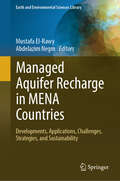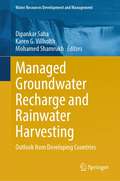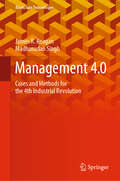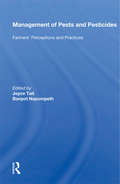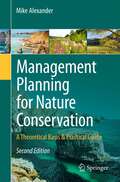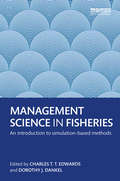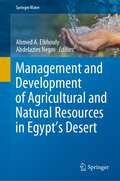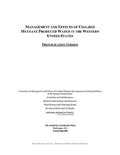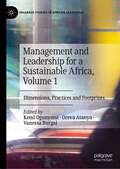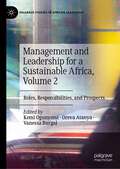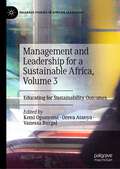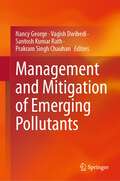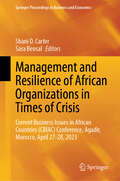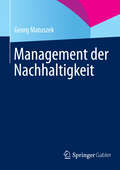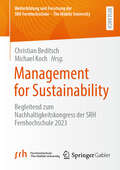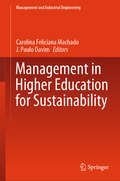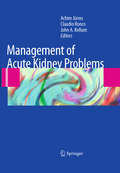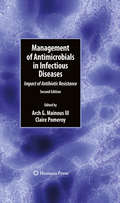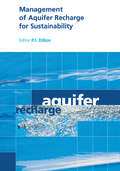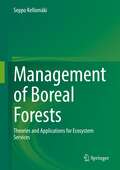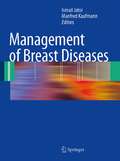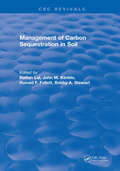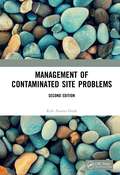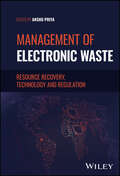- Table View
- List View
Managed Aquifer Recharge in MENA Countries: Developments, Applications, Challenges, Strategies, and Sustainability (Earth and Environmental Sciences Library)
by Mustafa El-Rawy Abdelazim NegmThis book presents an updated state-of-the-art for managed aquifer recharge (MAR) for MENA regions. MENA regions are home to 6% of the world's population but only possess 1.4% of its water resources with almost absolute scarcity. Groundwater is the primary source of water in 54% of MENA countries. Therefore, the MENA regions seek sustainable management solutions amid its arid climate and rising demands from urbanization and agriculture. MAR aims to help sustain groundwater resources. This book explores MAR as a strategic approach to reducing water security by enhancing groundwater supplies. Utilizing techniques such as soil aquifer recharge, aquifer storage and recovery, rainfall harvesting, and riverbank filtration. The presented case studies offer deep insights into MAR methods, their implementation, and MAR technologies. The beneficiaries of the book include postgraduate students, academics, policymakers, and practitioners in water resources.
Managed Groundwater Recharge and Rainwater Harvesting: Outlook from Developing Countries (Water Resources Development and Management)
by Karen G. Villholth Dipankar Saha Mohamed ShamrukhThis book, through its 19 chapters, highlights success stories, research outputs and various government schemes and actions taken on groundwater recharge and rainwater harvesting in developing countries. The interventions are focused on resolving water crises through supply side interventions, improving water quality and addressing climate change impacts. The contributions from across the globe shows how these approaches have been successful in supplementing potable water supply, reducing the intensity of overexploitation of groundwater resources, better storm water management, intensifying treated grey water reuse, and improving groundwater quality and environmental flows. The chapters deal with a wide array of issues, from local-scale experimentation and management to government schemes adopted, community involvement, private sector engagement, addressing socio-economic issues and policy interventions. The book includes contributions made by researchers, government departments, civil societies, policymakers and practitioners from 15 Non-Aligned Movement (NAM) and other developing countries, namely Afghanistan, Bangladesh, Chile, Colombia, Egypt, Guatemala, India, Jordan, Morocco, Nigeria, Palestine, Qatar, South Africa, Sri Lanka and Tunisia. The book places before the readers, the strives being undertaken in the Global South to address the sustainability of water resources and climate change adaptation through traditional and innovative methods to groundwater recharge, water harvesting and storage.
Management 4.0: Cases and Methods for the 4th Industrial Revolution (Blockchain Technologies)
by Madhusudan Singh James R. ReaganThis book provides a comprehensive review of industry 4.0 and its applications, discussing the history of industry evaluation, including industry 1.0, 2.0, 3.0 and 4.0, and the future structure of industry evaluation. It also examines the effects and impact of various technologies in industry and presents new interdisciplinary business models based on advanced technologies with the help of use cases. Lastly, it highlights the benefits of technological implementation in industry using examples of real-world applications, providing a robust and reliable technological conceptual framework and roadmap for decision-makers in all areas of industry involved transformation.
Management Of Pests And Pesticides: Farmers' Perceptions And Practices
by Joyce Tait Banpot NapompethThe contributors discuss pesticide production, distribution, and use; the problems caused by pests and pesticides; and the role of integrated pest management in minimizing these problems. describes research at the international and regional level, and addresses individual farmers' pesticide usage, their perceptions of pests and pesticides, and the relationship of the farmers' practices and attitudes to the development of integrated pest-management systems. The book concludes with a summary of research achievements and a discussion of future prospects.
Management Planning for Nature Conservation: A Theoretical Basis & Practical Guide
by Mike AlexanderThe first edition of Mike Alexander's Management Planning for Nature Conservation, brought a new dimension to the modern literature on conservation management. This second edition, a significant enhancement of the original, deals with the development both, conceptual and practical, of adaptive management planning for nature conservation. It is about preparing management plans, and guides the reader through the entire process. Case-studies, including a conservation and access plan, demonstrate the planning process in action. This approach to planning can be applied to any place which is managed entirely, or in part, for wildlife. It can be applied to the management of species or habitats in any circumstance, regardless of site designation. The process is fully compatible with the Convention on Biological Diversity's 'ecosystem approach' to conservation management. Mike Alexander has long been at the forefront of developing management planning for conservation, with experience ranging from Uganda to Estonia, and from Costa Rica to Wales. He is the General Secretary of the Conservation Management System Consortium, a group of organisations with a common aim of raising standards and developing best practice in conservation management and planning. In 2012 Mike Alexander was elected a Fellow of the Society of Biology in recognition of his contribution to nature conservation and in particular management planning. This book has drawn on the experiences and expertise of the CMS consortium and other leaders in both conservation research and wildlife management from around the world. It is essential reading for professional conservation managers and any student studying management planning for conservation within a range of degree and postgraduate courses.
Management Science in Fisheries: An introduction to simulation-based methods (Earthscan Oceans)
by Charles T.T. Edwards Dorothy J. DankelA key goal of fisheries management is to regulate extractive pressure on a resource so as to ensure social, economic and ecological sustainability. This text provides an accessible entry point for students and professionals to management science as developed in fisheries, in order to facilitate uptake of the latest ideas and methods. Traditional management approaches have relied upon a stock assessment based on existing understanding of resource status and dynamics, and a prediction of the likely future response to a static management proposal. However all such predictions include an inherent degree of uncertainty, and the last few decades have seen the emergence of an adaptive approach that uses feedback control to account for unknown future behaviour. Feedback is achieved via a control rule, which defines a relationship between perceived status of the resource and a management action. Evaluations of such rules usually include computer simulation testing across a broad range of uncertainties, so that an appropriate and robust rule can be selected by stakeholders and managers. The book focuses on this approach, which is usually referred to as Management Strategy Evaluation. The book is enriched by case study examples from different parts of the world, as well as insights into the theory and practice from those actively involved in the science of fisheries management.
Management and Development of Agricultural and Natural Resources in Egypt's Desert (Springer Water)
by Abdelazim Negm Ahmed A. ElkhoulyThis book reviews the economic potential of various natural resources found in the Egyptian deserts that could help fill the food gap in Egypt, e.g., the date palm, olives, and domestic animals. Bearing in mind that the entire country is subject to arid or hyperarid climatic conditions, only a small portion (3% of total area) is agriculturally productive in comparison, the dominant deserts. These aspects, combined with a growing population (ca. 100 million citizens) and water resources scarcity, have produced severe adverse effects on natural resource utilization. This book presents innovative methods for addressing desert soil's key problems (soil erosion, salinity, pollution, decreased fertility, minerals, and weed and pest control). Its goal is to help authorities reclaim the desert and optimally utilize the minerals and the available natural resources to support the sustainability agenda 2030. Besides, it offers researchers guidance on remaining gaps and future research directions. Lastly and importantly, it provides essential information on investment opportunities in desert cultivation, such as the fields of food, fodder, and medicinal plants.
Management and Effects of Coalbed Methane Produced Water in the Western United States
by National Research Council of the National AcademiesIn some coalbeds, naturally occurring water pressure holds methane--the main component of natural gas--fixed to coal surfaces and within the coal. In a coalbed methane (CBM) well, pumping water from the coalbeds lowers this pressure, facilitating the release of methane from the coal for extraction and use as an energy source. Water pumped from coalbeds during this process--CBM 'produced water'--is managed through some combination of treatment, disposal, storage, or use, subject to compliance with federal and state regulations. CBM produced water management can be challenging for regulatory agencies, CBM well operators, water treatment companies, policy makers, landowners, and the public because of differences in the quality and quantity of produced water; available infrastructure; costs to treat, store, and transport produced water; and states' legal consideration of water and produced water. Some states consider produced water as waste, whereas others consider it a beneficial byproduct of methane production. Thus, although current technologies allow CBM produced water to be treated to any desired water quality, the majority of CBM produced water is presently being disposed of at least cost rather than put to beneficial use. This book specifically examines the Powder River, San Juan, Raton, Piceance, and Uinta CBM basins in the states of Montana, Wyoming, Colorado, New Mexico, and Utah. The conclusions and recommendations identify gaps in data and information, potential beneficial uses of CBM produced water and associated costs, and challenges in the existing regulatory framework.
Management and Leadership for a Sustainable Africa, Volume 1: Dimensions, Practices and Footprints (Palgrave Studies in African Leadership)
by Kemi Ogunyemi Vanessa Burgal Oreva AtanyaTo effectively deliver sustainable management in practice for Africa, we need responsible leadership. We need to deepen our understanding of sustainability in the unique socio-political and economic context of the continent. The roles of various actors across public, private and non-profit sectors as enablers of sustainable development need to be explored to understand the social, economic and environmental (SEE) trends in Africa and its emerging and developing economies, as well as to chart the way forward for the continent.This first volume focuses on the African understanding of sustainability and its dimensions within its unique historical, social, environmental and political contexts. Through the lens of responsible leadership, the authors reflect on the implementation and extension of the SEE sustainability triad in ways unique to the African continent, especially in relation to the development of well-thought-out, healthy and enduring policy frameworks and the promotion of good governance. The African scope of the book is hinged on collaboration from authors across Africa and the inclusion of case stories from emerging economies in the five African subregions (East, West, North, Central and Southern Africa) within the chapters. The core message is that, to achieve effective and sustainable management and development for Africa, the practice of responsible leadership is critical.
Management and Leadership for a Sustainable Africa, Volume 2: Roles, Responsibilities, and Prospects (Palgrave Studies in African Leadership)
by Kemi Ogunyemi Vanessa Burgal Oreva AtanyaTo effectively deliver sustainable management in practice for Africa, we need responsible leadership. We need to deepen our understanding of sustainability in the unique socio-political and economic context of the continent. The roles of various actors across public, private and non-profit sectors as enablers of sustainable development need to be explored to understand the social, economic and environmental (SEE) trends in Africa and its emerging and developing economies, as well as to chart the way forward for the continent.This second volume explores the roles and responsibilities of the players—leaders and followers—in the core, public purpose and business spheres in delivering sustainable development outcomes for Africa. Drawing on interviews, cases and extensive literature, this volume contributes to reflection on the leadership values and practices required for a sustainable Africa and the crafting of new policy approaches to address the development challenges such as environmental degradation, economic inequities and social exclusion in Africa. The African scope of the book is hinged on collaboration from authors across Africa and the inclusion of case stories from emerging economies in the five African subregions (East, West, North, Central and Southern Africa) within the chapters. The core message is that, to achieve effective and sustainable management and development for Africa, the practice of responsible leadership is critical.
Management and Leadership for a Sustainable Africa, Volume 3: Educating for Sustainability Outcomes (Palgrave Studies in African Leadership)
by Kemi Ogunyemi Vanessa Burgal Oreva AtanyaTo effectively deliver sustainable management in practice for Africa, we need responsible leadership. We need to deepen our understanding of sustainability in the unique socio-political and economic context of the continent. The roles of various actors across public, private and non-profit sectors as enablers of sustainable development need to be explored to understand the social, economic and environmental (SEE) trends in Africa and its emerging and developing economies, as well as to chart the way forward for the continent. This third volume focuses on education as a tool to build a sustainable Africa. It explores the use of pedagogical approaches, learning resources, and policy implementation to develop African leaders and managers with a sustainability mindset that feeds into leadership decision-making, systemic change management, and efficient and sustainable transfers of knowledge and practice. The case stories from various academic institutions present practicable and innovative ideas for educating those who will lead sustainable development for Africa’s future. The African scope of the book is hinged on collaboration from authors across Africa and the inclusion of case stories from emerging economies in the five African subregions (East, West, North, Central and Southern Africa) within the chapters. The core message is that, to achieve effective and sustainable management and development for Africa, the practice of responsible leadership is critical.
Management and Mitigation of Emerging Pollutants
by Nancy George Vagish Dwibedi Santosh Kumar Rath Prakram Singh ChauhanThis book offers a comprehensive overview of the environmental challenges posed by emerging pollutants and the innovative strategies available for their management. Divided into 16 chapters, the book begins with an introduction to the origin and management of both inorganic and organic contaminants, offering a detailed examination of their sources and the potential risks they pose to ecosystems. It also explores current regulations and management practices aimed at mitigating their impact. In the following chapters, experts in the field cover topics such as conventional wastewater treatment methods for the removal of emerging pollutants, biotechnology-based strategies for the removal of emerging contaminants, microbial electro-deionization technologies, and algae-based bioremediation. Particular attention is given to specific remediation techniques, including phytomediated approaches, microbial fuel cells, and the novel application of microbial endophytes. Furthermore, the book explores the potential of nano-bioremediation and enzyme immobilization technologies, shedding light on their mechanism of interaction with nanomaterials and microbes for efficient treatment. Other chapters highlight the role of graphene-based nanocomposites, bio-based porous materials, and biosurfactants in the remediation of emerging pollutants, showcasing their unique capabilities and potential applications. In the final chapter of the book, readers will discover more about the impacts of emerging pollutants on environmental microbial communities and the consequential public health concerns that arise from their presence. Given its breadth, this book is a valuable resource for environmental scientists, policymakers, and industry professionals seeking to mitigate the ecological risks associated with these contaminants.
Management and Resilience of African Organizations in Times of Crisis: Current Business Issues in African Countries (CBIAC) Conference, Agadir, Morocco, April 27-28, 2023 (Springer Proceedings in Business and Economics)
by Shani D. Carter Sara BensalBusinesses in African countries continued to face crises due to COVID-19, supply chain, and climate change. Governments can take steps to increase businesses’ resilience by supporting and promoting sustainable development. In turn, businesses can increase their resilience by promoting the resilience of their employees. This book explores the current state of management and resilience in African nations and discusses issues that revolve around its reciprocal impact on global business, government, and society. Featuring select papers from the 4th Annual Current Business Issue in African Countries (CBIAC) Conference held in Agadir, Morocco in 2023, this book focuses on the synergies between climate change, supply chain and sustainable development, particularly post pandemic featuring content from business and NGO leaders, faculty, and students. The impetus of the CBIAC conference was the discussions held at the United Nations Conference on Trade and Development (UNCTAD) held in Nairobi, Keyna in July 2016 and in Bridgetown, Barbados, and Geneva in October. The goal of the conference is to create long-term collaborative relationships between business leaders, faculty, researchers, students, and community members from different African nations.
Management der Nachhaltigkeit
by Georg MatuszekDie globale wirtschaftliche Verantwortung liegt sowohl bei Unternehmen als auch bei Konsumenten. Immer mehr kommt es darauf an, wie die Unternehmen ihr Change-Management in Sachen Nachhaltigkeit beherrschen und inwieweit sie aus der Beziehung mit den Konsumenten interaktiv lernen. Das Buch zeigt neue Techniken des Nachhaltigkeitsmanagements auf und verweist auf die faszinierenden Möglichkeiten, globale Verantwortung in der Werte-Ökonomie durchzuspielen.Unternehmer und Manager werden mit den neuen Marketing-Tools der Zertifizierung konfrontiert und in die Lage versetzt, damit in den modernen Netzwerken präsent zu sein und auf diese Weise Wettbewerbsvorteile zu realisieren.
Management for Sustainability: Begleitend zum Nachhaltigkeitskongress der SRH Fernhochschule 2023 (Weiterbildung und Forschung der SRH Fernhochschule – The Mobile University)
by Michael Koch Christian BeditschWir leben weit über unsere Verhältnisse – in Deutschland so, als hätten wir drei Erden zur Verfügung. Die internationalen Nachhaltigkeitsziele und das Pariser Klimaschutzabkommen geben die Richtung vor: Unternehmen weltweit sind dazu aufgerufen, den ökologischen, sozialen und ökonomischen Zielsetzungen der Weltgemeinschaft gerecht zu werden. Aber was bedeutet das konkret? Unsere Expert:innen wissen Bescheid. Der vorliegende Kongressband umfasst Beiträge zu aktuellen Herausforderungen und Erkenntnissen zum Thema nachhaltiges Wirtschaften.
Management in Higher Education for Sustainability (Management and Industrial Engineering)
by J. Paulo Davim Carolina Feliciana MachadoThis book offers a profound exploration of management in higher education for sustainability. From the integration of sustainability into curricula to sustainable campus practices, from interdisciplinary collaboration to technology-driven innovations, the book provides a holistic view of the multifaceted landscape of sustainability in academia. It also addresses critical issues such as student mobilization, impact assessment, and partnerships with industry and environmental organizations. With a focus on institutional policies and strategies, the book navigates the challenges and barriers faced by higher education institutions, providing invaluable insights into achieving sustainable practices. Additionally, it examines vital areas including online education accessibility, financial management for sustainability, and professional development for educators. Furthermore, the book explores the role of campus architecture and planning, assessing social and environmental impacts, and fostering international collaborations for sustainable education.
Management of Acute Kidney Problems
by John A. Kellum Achim Jörres Claudio RoncoAcute kidney failure is an important clinical area in the intensive care unit setting. An estimated 5-20% of critically ill patients experience an episode of acute kidney failure during the course of their illness, and about 5% of patients admitted to an ICU will eventually require renal replacement therapy. In these patients, in-hospital mortality is extremely high, exceeding 50%. Thus, the early detection and causal treatment of acute kidney problems is vitally important for a successful outcome. Written by internationally renowned experts, this clinical reference offers helpful advice with the most recent information on the definition, epidemiology, pathophysiology, and clinical causes of acute kidney failure as a fundamental prerequisite for prevention of this disorder. Moreover, it also covers differential diagnostic approaches for patients with acute renal failure and provides a detailed outline of important measures for their clinical management. Finally, separate chapters are dedicated to various key aspects related to the adequate delivery of acute renal replacement therapy. It is intended as a helpful guide for all clinicians involved in the care of patients at risk of developing acute kidney problems.
Management of Antimicrobials in Infectious Diseases
by Arch G. Mainous III Claire PomeroyRecent evidence suggests an increasing rate of antimicrobial resistant pathogens throughout the world. Pathogens like Staphylococcus aureus are showing substantial prevalence of resistance to antibiotics. Thus, we think that given these developments, clinicians would welcome an updated version of this book. A resource indicating appropriate, evidence-based antimicrobial treatment of infectious diseases encountered in both the hospital and outpatient settings would be of significant value to practicing clinicians. The book would focus on the clinical importance of appropriate diagnosis and treatment of infectious diseases particularly in terms of antibiotic-resistance. The resource would be valuable to countless numbers of junior-level practitioners (residents, nurse practitioners, physician-assistants). Moreover, the book could be a resource for generalists as well as infectious disease specialists.
Management of Aquifer Recharge for Sustainability: Proceedings of the 4th International Symposium on Artificial Recharge of Groundwater, Adelaide, September 2002
by Peter J. DillonThis title offers more than 100 papers originating in 20 countries, covering research on a widening range of methods for recharge enhancement and groundwater quality protection and improvement. These include: bank filtration; aquifer storage and recovery; and soil aquifer treatment, as well as rainwater harvesting and pond infiltration. The emphasis is on understanding subsurface process to improve siting, design and operation and to facilitate use of stormwater and reclaimed water, particularly in water-scarce areas.
Management of Boreal Forests: Theories and Applications for Ecosystem Services
by Seppo KellomäkiThis comprehensive textbook explores the boreal forests of Northern Europe, Finland, Sweden and Norway. Students will gain an overview of the forest ecosystem and the services it provides for modern society. From the production of timber, to the supply of food products or their use as a recreational space for human wellbeing – our forests serve many needs. Accordingly, the respective chapters cover various types of ecosystem service, e.g. supporting, provisioning, regulating and cultural services. The book’s main focus is on the management of boreal forests for the production of these ecosystem services. Addressing modern challenges, e.g. managing vulnerable boreal forests for adaptation to climate change, is an important aspect throughout the volume. Traditional forest management has to adapt and evolve in order to meet the increasing risk of abiotic and biotic damages to our forest biomass. Future forestry graduates will have to face more and more of these challenges; consequently, the book provides them with a wealth of scientific knowhow and possible counter-strategies. Forestry students in the Northern Hemisphere, be it in Europe, North America or Asia, will find this book an excellent reference guide. To make the content more accessible, it has been enriched with a clear structure, numerous illustrations and learning objectives.
Management of Breast Diseases
by Ismail Jatoi Manfred KaufmannThis multi-authored and comprehensive work provides a reference to the overall management of diseases of the breast (both benign and malignant). Pertinent controversies are discussed, and perspectives presented from both sides of the Atlantic. This highly practical guide serves as a reference for the wide range of physicians and surgeons who treat diseases of the breast.
Management of Carbon Sequestration in Soil (Advances In Soil Science Ser. #10)
by Rattan LalThis book addresses the importance of soil processes in the global carbon cycle.Agricultural activities considered responsible for an increase in CO2 levels in our atmosphere include: deforestation, biomass burning, tillage and intensive cultivation, and drainage of wetlands.However, agriculture can also be a solution to the problem in which carbon can be removed from the atmosphere and permanently sequestered into the soil. Management of Carbon Sequestration in Soil highlights the importance of world soils as a sink for atmospheric carbon and discusses the impact of tillage, conservation reserve programs (CRP), management of grasslands and woodlands, and other soil and crop management and land use practices that lead to carbon sequestration.
Management of Combined Sewer Overflows
by Richard Field Daniel Sullivan Anthony N. TafuriThere are approximately 10,000 combined sewer overflow (CSO) locations in the United States. During peak storm events they can release about 1.2 trillion gallons of waste and up to 95% of a municipality's raw sewage into surface waters. Although many cities have initiated programs, the CSO problem remains largely unsolved and continues to be a majo
Management of Contaminated Site Problems, Second Edition
by Kofi Asante-DuahThis book will outline the strategies used in the investigation, characterization, management, and restoration and remediation for various contaminated sites. It will draw on real-world examples from across the globe to illustrate remediation techniques and discuss their applicability. It will provide guidance for the successful corrective action assessment and response programs for any type of contaminated land problem, and at any location. The systematic protocols presented will aid environmental professionals in managing contaminated land and associated problems more efficiently. This new edition will add twelve new chapters, and be fully updated and expanded throughout.
Management of Electronic Waste: Resource Recovery, Technology and Regulation
by Anshu PriyaMANAGEMENT OF ELECTRONIC WASTE Holistic view of the current and future trends in electronic waste management, focusing on recycling, technologies, and regulations Management of Electronic Waste delivers a complete overview of all aspects related to the toxicity characterization of electronic wastes, along with other important topics including resource recovery, recycling strategies, biotechnological advancements, and current perspectives on waste generation and management. The book presents hazards associated with conventional recycling methods and highlights environmentally compatible economic approaches for resource recovery, along with eco-friendly strategies for management of electronic wastes. The high metallic content, heterogeneous and composite nature of e-wastes make them a rich secondary reservoir of metals. The book explores the valuable potential of e-waste and highlights the eco-friendly, sustainable technologies and recycling strategies for the profitable and effective conversion of waste to wealth. Written by a highly qualified and internationally renowned author, Management of Electronic Waste covers sample topics such as: Rise of e-waste generation paired with rising economies and mounting demand for electrical and electronic devices, with a country-by-country breakdown Status of e-waste management and recycling efforts around the world, along with key processes that drive e-waste recycling Macroeconomic trends between global demand and supply for metal resources and the transition of linear to circular economy Bioleaching, an economic and green approach for recovery of metals, from e-waste and other low grade metal repositories Different metallurgical approaches for extraction and recovery of resources from e-waste and their pros and cons Filling a gap on the understudied biotechnological recycling techniques and methods for mitigating environmental pollution caused by electronic waste, Management of Electronic Waste serves as an excellent guide on the subject for electronic waste producers, consumers, recycling industries, policy and law makers, academicians, and researchers.
